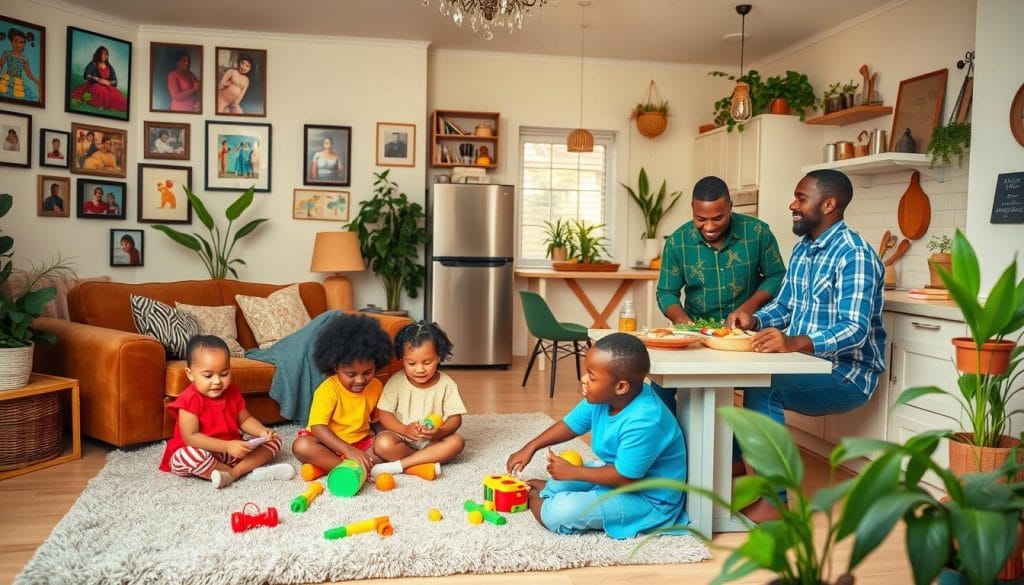For African American families, embracing black joy and healing is crucial in the face of centuries of systemic racism and oppression. Black families have long recognized the importance of community support networks in promoting resilience and well-being. In African American households, the need for positive identity development, supportive networks, and shared experiences is essential for healing and thriving.
Research highlights the significance of black joy as a tool for resistance and resilience, enabling individuals and groups to counter negative narratives and events. The Black Joy movement emphasizes the importance of survival and development, focusing on present-day challenges and future growth. African American families can benefit from this movement by affirming their identity and agency, rejecting narratives of victimhood in the face of violence and discrimination.
The cultural expressions of Black Joy are linked to historical resilience, and community engagement with Black Joy has been associated with improved mental health outcomes in African American populations. By promoting joyful cultural practices, African American families can significantly contribute to emotional well-being and community solidarity.
Key Takeaways
- Embracing black joy and healing is essential for African American families to counter systemic racism and oppression.
- Community support networks play a crucial role in promoting resilience and well-being in African American households.
- The Black Joy movement emphasizes the importance of survival and development, focusing on present-day challenges and future growth.
- Practices that support Black joy are linked to improved psychological resilience and identity development among African American children.
- Creating a Black-affirming environment is essential for promoting positive outcomes in children’s mental health.
- Engaging in joyful cultural practices can significantly contribute to emotional well-being and community solidarity among African Americans.
Understanding Positive Identity Development
Positive identity development is crucial for minority families, particularly in the African American community, as it enables them to navigate a society that often devalues their experiences. Diverse households can promote positive identity development by understanding the importance of self-identity and cultural influences. This, in turn, can help build resilience in the face of adversity.
Research has shown that focus on identity development is linked to a reduction in risk behaviors and promotion of healthy adolescent development among African American youth. Key theories, such as Erikson’s psychosocial development theory and Marcia’s identity statuses theory, highlight the significance of identity formation during adolescence. For instance, Erikson describes identity as integrating biological, psychological, and societal demands, with successful identity achievement correlating to effective navigation of social contexts.
The Importance of Self-Identity
Self-identity plays a vital role in shaping the experiences of African American families. By understanding and embracing their self-identity, individuals can develop a sense of belonging and purpose. This, in turn, can help them navigate the challenges posed by systemic racism and social inequality. As Dr. Aisha White notes, her long-term involvement in early childhood education has highlighted the importance of positive racial identity development in diverse households.
How Culture Shapes Identity
Culture has a profound impact on identity development, particularly in minority families. The intersection of race and ethnicity with social status can make identity attainment complex for African American adolescents. However, by acknowledging and embracing their cultural heritage, individuals can develop a positive sense of identity. This can be achieved through initiatives such as the Positive Racial Identity Development in Early Education (P.R.I.D.E.) program, which focuses on Black children aged 3 to 8 and addresses their unique challenges in developing a healthy racial identity.
By promoting positive identity development, we can empower minority families and diverse households to thrive in a society that often marginalizes their experiences. As we continue to navigate the complexities of identity development, it is essential to recognize the importance of self-identity and cultural influences in shaping the experiences of African American families.
The Role of Community in Healing
Community plays a vital role in the healing process for African American families, who often rely on supportive networks and shared experiences to cope with the challenges of systemic racism. The black family structure is a crucial aspect of this community, providing a sense of belonging and identity.
African American parenting styles and African American traditions are essential components of this community, influencing the way families interact and support one another. By building supportive networks and encouraging shared experiences, African American families can promote healing and well-being.
Some key aspects of community support include:
- Building trust and rapport among community members
- Providing emotional support and guidance
- Sharing resources and experiences
These aspects are critical in fostering a sense of community and promoting healing among African American families.
Celebrating Black Joy
Celebrating black joy is essential for African American families, as it helps to build resilience and promote well-being in the face of societal challenges. By promoting collective happiness and using art and expression as healing tools, black families can create a positive and supportive environment.
Research has shown that black children benefit from seeing themselves reflected in their environment, contributing to a healthy sense of identity and cultural pride. This can be achieved through community-based programs that promote black joy and well-being, such as art initiatives and cultural events.

In addition, the representation of black individuals in media and art is crucial for promoting black joy. The HBO documentary “Black Art: In the Absence of Light” highlights the significance and impact of African American art, showcasing its importance in shaping black identity and culture. By celebrating black joy and promoting positive representation, African American families can create a sense of community and belonging, which is essential for their well-being and resilience.
Some key aspects of celebrating black joy include:
- Promoting collective happiness and well-being
- Using art and expression as healing tools
- Creating a positive and supportive environment
- Promoting representation and diversity in media and art
By embracing these aspects, black families can build a strong sense of identity and community, which is essential for their well-being and resilience. Celebrating black joy is not only a way to promote happiness and well-being but also a way to resist oppression and create a more just and equitable society.
Resilience in the Face of Adversity
For minority families and diverse households, particularly in the African American community, resilience is crucial in overcoming the challenges posed by systemic racism and socioeconomic disparities. According to research, 34% of the nation’s poor reside in the Black Belt region, which includes 623 counties across 11 southern states.
Studies have shown that low-SES children experience disproportionately high rates of growth restriction, preterm births, and neonatal mortality. Furthermore, low-SES youth show higher prevalence rates for obesity, insulin resistance, and asthma compared to their more advantaged peers. However, resilience strategies can lead to transformative social justice outcomes, as indicated by a substantial portion of successful interventions in African American communities.
Some key factors that contribute to resilience in the face of adversity include:
- Racial socialization, which has been linked to enhanced resilience
- Positive adaptations, such as coping mechanisms and support networks
- Community-based programs that promote resilience and well-being
By understanding the importance of resilience and implementing effective strategies, minority families and diverse households can build stronger, more supportive communities. As research shows, resilience traits persist into adulthood, with African American adults exhibiting higher levels of resilience irrespective of socioeconomic status.
| Factor | Contribution to Resilience |
|---|---|
| Racial socialization | Enhanced resilience |
| Positive adaptations | Transformative social justice outcomes |
| Community-based programs | Promote resilience and well-being |
Mindfulness Practices for Well-being
Mindfulness practices are essential for promoting well-being, particularly in the context of black family structure and African American parenting. By incorporating mindfulness techniques into daily life, individuals can reduce stress and improve their overall mental health. African American traditions, such as those rooted in Nguzo Saba and MAAT, can provide a culturally relevant framework for mindfulness practices.
Research has shown that mindfulness interventions can have a positive impact on psychological health outcomes, including reduced stress and improved sleep quality. For example, a study found that mindfulness practices can reduce chronic psychological stress, which is particularly prevalent in African American communities. The development of apps like Blackfullness, which provides mindfulness practices tailored to the African American experience, is a significant step towards addressing the mental health needs of this community.

Some benefits of mindfulness practices for African American families include:
- Reduced stress and anxiety
- Improved sleep quality
- Increased self-awareness and self-regulation
- Enhanced emotional well-being
By embracing mindfulness practices and African American traditions, individuals can cultivate a stronger sense of identity and community, leading to improved overall well-being. As the African American community continues to navigate the challenges of societal stress and anxiety, the importance of mindfulness practices cannot be overstated.
| Mindfulness Practice | Benefits |
|---|---|
| Meditation | Reduced stress and anxiety, improved sleep quality |
| Deep breathing | Increased self-awareness and self-regulation, enhanced emotional well-being |
| Yoga | Improved physical and mental health, increased sense of community |
The Influence of Role Models
For African American families, role models play a vital role in shaping the lives of their children. The presence of positive role models can have a significant impact on the development of black families, particularly in terms of education and career aspirations. A study found that adolescents with identifiable role models received higher grades compared to those without role models.
In an African American household, having a role model can be a powerful influence on a child’s life. For example, Chadwick Boseman, an influential African American actor, starred in the major film Black Panther, contributing significantly to representation in media. His resilience in the face of adversity is an inspiration to many black families.
Some of the ways role models can positively impact African American families include:
- Providing guidance and mentorship
- Encouraging education and career aspirations
- Modeling positive behaviors and values
By nurturing new leaders in the community, African American families can promote positive identity development and build resilience. This can be achieved through community-based programs that promote leadership development and well-being.
The Intersection of Heritage and Identity
Embracing cultural heritage and identity is essential for minority families, particularly in the African American community. By understanding and appreciating their cultural roots, individuals can develop a stronger sense of self and belonging. This is especially important for diverse households, where multiple cultural influences may be present.
In the context of African American families, cultural heritage and identity are deeply intertwined. Storytelling is a powerful tool for passing down cultural traditions and values from one generation to the next. By sharing stories and experiences, family members can connect with their heritage and develop a sense of pride and identity.
Some key aspects of cultural heritage and identity in the African American community include:
- Cultural traditions and customs
- Family history and storytelling
- Community support and connection
By embracing their cultural heritage and identity, minority families can build resilience and promote positive identity development. This is especially important in the face of societal challenges and marginalization. As we move forward, it is essential to recognize the importance of cultural heritage and identity in shaping the experiences of African American families and diverse households.
Education and Empowerment
Education is a critical component of empowerment for African American families, particularly in the context of black family structure and African American parenting. By promoting representation in education and supporting programs that foster positive identity development, families can build resilience and promote well-being.
Research has shown that empowered caregivers report enhanced self-care and self-efficacy, contributing to improved family empowerment and coping skills. Education targeted at caregivers results in decreased feelings of dishonor about mental illness, and caregivers report a higher sense of control, indicating greater abilities in expressing their needs, accessing information, and making decisions.
Community-based programs that promote education and empowerment are essential for African American families. These programs focus on enhancing self-efficacy, advocacy, and problem-solving abilities through structured activities. For example, empowerment education programs for African American grandmothers focus on topics necessary for proper care of themselves and their grandchildren, contributing to skillful advocacy within the community.
By embracing African American traditions and promoting education and empowerment, families can create a supportive environment that fosters positive identity development and resilience. This, in turn, can help to break down barriers and promote well-being for African American families.
| Program | Focus | Outcome |
|---|---|---|
| Empowerment Education | Self-efficacy, advocacy, and problem-solving | Improved family empowerment and coping skills |
| Community-Based Initiatives | Structured activities and support networks | Enhanced self-care and self-efficacy |
Creating Safe Spaces
Establishing safe spaces is crucial for fostering the well-being and resilience of African American families. These spaces provide a sanctuary where individuals can engage in open and honest conversations without fear of harm or judgment. By promoting affinity groups and facilitating inclusive dialogues, we can empower African American households to navigate the challenges they face and find strength in shared experiences.
Importance of Affinity Groups
Affinity groups, where members share a common identity or background, offer a sense of belonging and community for African American families. These groups serve as a platform for exchanging ideas, providing mutual support, and celebrating cultural traditions. They foster a safe environment where individuals can feel understood and validated, ultimately strengthening their positive identity development.
Facilitating Open Conversations
Creating opportunities for open and honest conversations is vital for addressing the unique needs of African American households. Through facilitated discussions, families can explore topics related to their heritage, identity, and the impact of systemic racism. These dialogues encourage healing, build trust, and empower participants to confront and overcome the challenges they face. By fostering a culture of open communication, we can cultivate resilience and promote the overall well-being of African American families.
FAQ
What is the importance of embracing black joy and healing for African American families?
How does positive identity development impact African American families?
What is the role of community in healing for African American families?
Why is celebrating black joy important for African American families?
How can African American families build resilience in the face of adversity?
What is the importance of mindfulness practices for African American families?
How do role models impact African American families?
Why is embracing cultural heritage and identity important for African American families?
How can education and empowerment support African American families?
What is the importance of creating safe spaces for African American families?
Source Links
- https://nmaahc.si.edu/explore/stories/black-joy-resistance-resilience-and-reclamation
- https://www.iecmhc.org/documents/CenteringEquityResource_BlackJoy_FNL.pdf
- https://www.embracerace.org/resources/nurturing-resilience-and-joy-in-among-young-bipoc-children-part-1-parents
- https://pmc.ncbi.nlm.nih.gov/articles/PMC3520439/
- https://www.embracerace.org/resources/in-my-skin-supporting-positive-racial-identity-development-in-black-children
- https://pmc.ncbi.nlm.nih.gov/articles/PMC6366503/
- https://afsp.org/story/the-role-of-the-church-in-improving-mental-wellness-in-the-african-american-commu
- https://www.linkedin.com/pulse/bridging-gap-importance-family-black-community-need-ryan-oneil-knight
- https://www.safehorizon.org/stories/celebrate-black-joy
- http://voiceofoc.org/2021/02/celebrating-black-joy-as-an-alternative-form-of-resistance-and-reclaiming-of-humanity/
- https://www.tmj4.com/lifestyle/black-history-month/exploring-the-meaning-of-black-joy
- https://pmc.ncbi.nlm.nih.gov/articles/PMC5079770/
- https://www.cambridge.org/core/journals/development-and-psychopathology/article/critical-examination-of-resilience-and-resistance-in-african-american-families-adaptive-capacities-to-navigate-toxic-oppressive-upstream-waters/120BDD26DBC42FCFC77FDBF7264854A3
- https://www.blackfullness.com/
- https://pmc.ncbi.nlm.nih.gov/articles/PMC7880239/
- https://gradstudies.musc.edu/about/blog/2022/03/overcoming-adversity
- https://pmc.ncbi.nlm.nih.gov/articles/PMC2752426/
- https://pmc.ncbi.nlm.nih.gov/articles/PMC7081969/
- https://newsroom.lmu.edu/administrative/finding-intersections-between-african-americans-and-indigenous-american-indians/
- https://pmc.ncbi.nlm.nih.gov/articles/PMC3169837/
- https://nmaahc.si.edu/explore/stories/struggle-against-segregated-education
- https://ssir.org/articles/entry/listening_to_black_parents
- https://www.commsor.com/post/community-safe-space-for-black-people
- https://kaboom.org/all-stories/creating-spaces-for-black-children/
